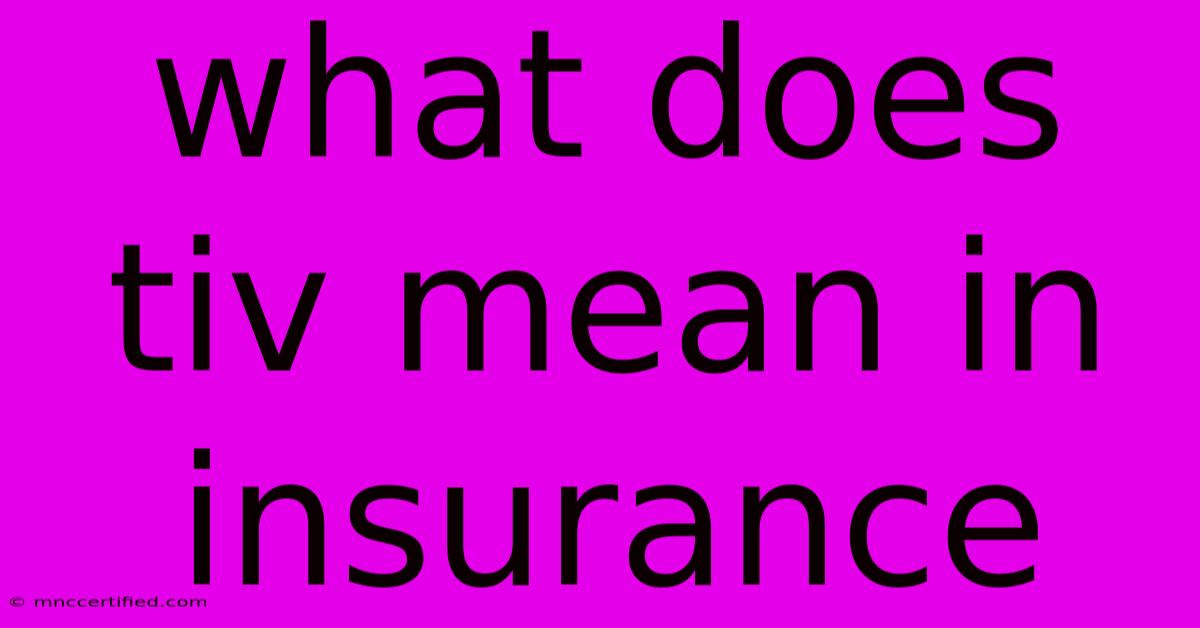What Does Tiv Mean In Insurance

Table of Contents
What Does TIV Mean in Insurance? Understanding Total Insured Value
Understanding your insurance policy can be tricky, and navigating the jargon is often the first hurdle. One term that frequently pops up, especially in commercial and high-value property insurance, is TIV. But what does TIV mean in insurance? Simply put, TIV stands for Total Insured Value. This article will delve into the meaning, calculation, and importance of TIV in your insurance coverage.
What is Total Insured Value (TIV)?
TIV represents the total sum of money an insurance company would need to pay to completely rebuild or replace your insured property, including the cost of demolition and debris removal, should it be completely destroyed. It's not simply the market value of your property; it encompasses the full cost of restoration to its pre-loss condition. This is a crucial distinction, as market value can fluctuate, while the cost of rebuilding remains relatively consistent (though it can, of course, rise with inflation).
Think of it like this: if a fire completely destroyed your house, TIV is the amount your insurer would pay to rebuild it to its original condition, not just the price you could sell it for on the current market.
TIV vs. Market Value: Key Differences
Many people mistakenly believe TIV and market value are interchangeable. They are not. Here's a breakdown of the key differences:
- Market Value: This is the price your property would sell for on the open market. It's influenced by factors like location, condition, and current market trends.
- Total Insured Value (TIV): This is the cost to rebuild or replace your property, including demolition and debris removal. It's focused on the cost of construction and materials, not market forces.
The discrepancy between TIV and market value can be significant, especially for older properties or those in areas with high construction costs. Understanding this difference is crucial for securing adequate insurance coverage.
How is TIV Calculated?
Calculating TIV requires a detailed assessment of your property. Insurance companies typically employ professionals, such as quantity surveyors or loss adjusters, who will:
- Inspect your property: They'll meticulously document the size, construction materials, and features of your building.
- Consider current construction costs: They'll factor in the current prices of materials and labor in your region.
- Include demolition and debris removal: These costs, often overlooked, are significant components of TIV.
- Account for any special features: Unique architectural details, high-end finishes, or specialized equipment will increase the TIV.
The final TIV calculation will be a detailed report reflecting all these factors. This makes it much more precise than simply estimating the rebuild cost.
Why is TIV Important?
Accurately determining your TIV is paramount for several reasons:
- Adequate Coverage: Underinsurance is a common problem. If your insurance coverage is less than your TIV, you'll face significant financial losses in the event of a total loss.
- Claims Settlement: Knowing your TIV ensures you receive the full amount needed to rebuild or replace your property without significant out-of-pocket expenses.
- Avoiding Disputes: Having a professionally determined TIV minimizes disputes with your insurer during the claims process.
- Commercial Insurance: TIV is particularly crucial for commercial properties, where the potential losses are considerably higher.
How to Determine Your TIV
You shouldn't attempt to calculate your TIV yourself; it requires specialized knowledge and expertise. Contact your insurance provider; they can often provide a TIV assessment or recommend a qualified professional to conduct one.
Conclusion: The Importance of Understanding TIV
Understanding TIV is crucial for protecting your financial interests. By ensuring your insurance coverage matches your TIV, you safeguard against the substantial financial burdens that can arise from property damage or destruction. Don't underestimate the importance of accurately determining your TIV – it could save you thousands, even millions, in the event of a claim. Always consult with your insurance provider to ensure you have adequate coverage.

Thank you for visiting our website wich cover about What Does Tiv Mean In Insurance. We hope the information provided has been useful to you. Feel free to contact us if you have any questions or need further assistance. See you next time and dont miss to bookmark.
Featured Posts
-
Arsenal Vs Forest Premier League Match Preview
Nov 23, 2024
-
Grounding And Bonding Transformers
Nov 23, 2024
-
Argyles Point Gray Braces Impact
Nov 23, 2024
-
Excellent Football Recent Match Review
Nov 23, 2024
-
Csu Womens Hoops Hosts Ohio Dominican
Nov 23, 2024